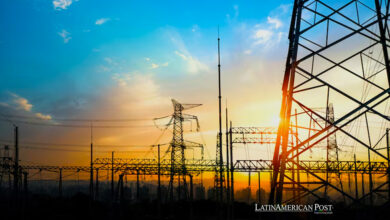Panic in the Argentine economy: this is the ‘Macrisis’ effect
Listen this article
Investor confidence in the floor and inflation in the sky. There seems to be no hope for the Argentine economy under Macri

For Argentina, last Wednesday was a 'Black Wednesday'. Investors in Argentine government bonds began to dispose of their assets en masse, a sign of a total loss of confidence in the economy. President Mauricio Macri, who in the campaign emerged as a leader capable of making the difficult but necessary decisions to avoid a new crisis, now faces the same fate as those who preceded him in his position.
Leer en español: Pánico en la economía argentina: este es el efecto de la ‘Macrisis’
It was also this Wednesday when the cost of securing financial assets to test a default in Argentina's external debt rose to its highest level in the three and a half years that Macri has been in power. Now, the only lender riskier than Argentina is Venezuela.
The same logic that encouraged the massive sale of government bonds, led to the massive sale of Argentine pesos and turned this currency into the worst performance worldwide. In just one day it depreciated 4% against the dollar, the next day it lost almost two percentage points to a historical low of 45.25 pesos per dollar.
Unorthodox measures
The response from the Casa Rosada, communicated on Wednesday of last week was to freeze the prices of 60 products, a measure that reminds investors of those taken by the government of Cristina Fernández de Kirchner, with whom Macri would beat in the next election, generated additional distrust.
Jan Dehn, an economist at Ashmore Group, an investment firm in emerging markets, said he was disappointed with the decision of the Argentine government in an interview with the British newspaper Financial Times.
"Consistent with its long tradition of mismanagement of the economy, the Argentine government abandoned last week its most recent attempt to follow an orthodox macroeconomic current in favor of the unorthodox measures that have resulted in the country's long history of bad economic performance. Argentina".
While the measure of freezing prices will have a positive effect on the pocket of Argentines in the short term, it does nothing to address the main underlying problem of the Argentine economy, the soaring inflation, which now exceeds 51%.
The reelection project continues
The economic crisis threatens Macri's re-election project, which is surely under pressure to improve its image in the eras that precede the election. At this moment, only 28% of Argentines have a positive image of Macri, while 44% approve of who would be their opponent, the former president Cristina Fernández de Kirchner.
Read also: Inflation in Argentina reached a historic peak
Despite the poor performance of the economy, the need to take emergency measures, and the growing unpopularity, Macri's re-election seems to have a fixed course. "As I said, I will be a candidate for president," he said in a statement to RadioFónica de Rosario.
His coparcenary, head of government of the city of Buenos Aires, Horacio Rodríguez Larreta, went out to support him, confirming that he is their candidate and ensuring that "the candidates are decided in Argentina, not on Wall Street."
With the popularity index as it is, Macri would only win in the second round the current governor of Salta, Juan Manuel Utubey, but lose against the other three candidates.
LatinAmerican Post | Pedro Bernal
Translated from "Pánico en la economía argentina: este es el efecto de la 'Macrisis'"





